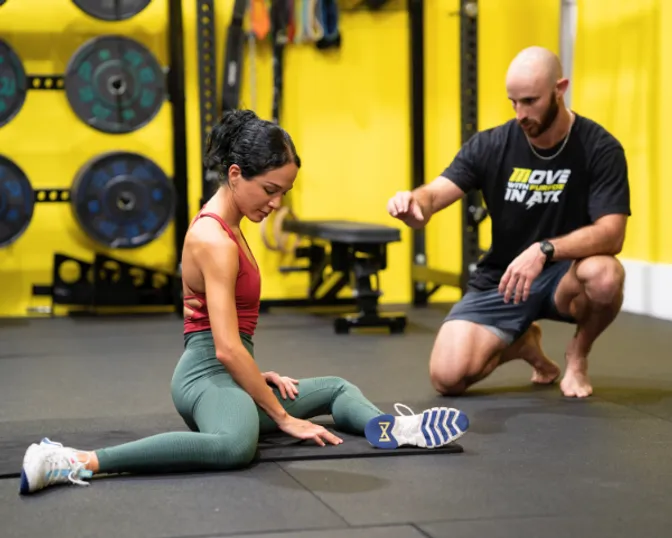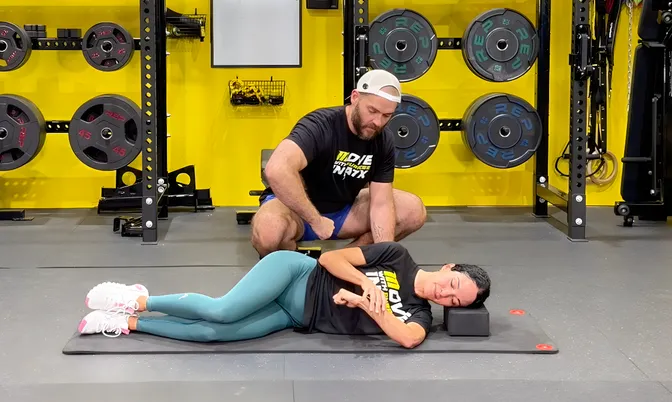Should You Use StretchLab?
July 21, 2024 | Stretching

In the fitness world, stretching has exploded into a full-blown industry. Studios like StretchLab market themselves as the answer to pain, stiffness, and poor mobility. Their model is simple: you walk in, lie on a table, and let someone else stretch you.
It’s convenient. It feels good in the moment. It’s a polished wellness experience.
The real question is the one most people avoid.
Does it improve mobility long-term, or does it mostly create a temporary shift that fades by tomorrow?
The quick answer
If you want relaxation and short-term relief, StretchLab can be worth it.
If you want mobility you can use, keep, and build on, assisted stretching is rarely enough on its own.
Why StretchLab feels good
Most StretchLab sessions are built around assisted stretching and contract-relax style methods. You’re being guided into positions you don’t usually access, with someone helping you relax and “let go” of tension.
That can work for a few reasons.
You downshift your nervous system
Most people live in a constant low-grade stress response. A calm room, slow movement, and human touch reduce perceived threat. When threat goes down, your system often releases some protective tension.
You increase tolerance for a position
A lot of tightness is not “short tissue.” It’s your body saying, “I don’t trust you here.” Assisted stretching can increase tolerance for a range temporarily.
You remove friction
You don’t have to plan, learn, or self-coach. That convenience is part of why people stick with it.
None of this is fake. It’s just not the same thing as building mobility.
Why it often doesn’t last
Mobility is not flexibility.
Mobility is usable range of motion; range you can actively control and produce force in.
Assisted stretching can help you access range. It does not automatically teach your body to own it.
If you gain a position passively but you can’t control it actively, your body often tightens things back up because it doesn’t trust that range yet. That’s why you can feel loose right after a session, then feel “tight again” the next morning.
To make changes stick, you usually need two things:
- A clear target based on what is actually limited.
- Strength and control at the end ranges you want to keep.
This is the core reason we emphasize active mobility training at Motive.
Three simple tests to tell if StretchLab is helping you
If you’re trying to decide if it’s worth continuing, use these.
Test 1: does the change last 24-48 hours?
If you consistently feel better for a day or two, great. If the effect disappears by tomorrow, you’re buying a short-term nervous system shift. That can still be valuable, but it’s not the same as adaptation.
Test 2: can you actively access the range you gained?
If someone can place you into a position but you can’t actively get there yourself, you found a control gap. That’s a training problem, not a stretching problem.
Test 3: is it always the same area?
If the same spot keeps tightening up, it’s often compensating for something else. Your body finds stability where it can.
This is one reason I like CARs as a daily tool. They expose what you can actually control and they give you a low-effort way to build joint options over time. If you want the deeper explanation, read A Deep Dive Into Controlled Articular Rotations.
Where FST fits in
StretchLab leans heavily on a system formerly known as Fascial Stretch Therapy (FST), now called Stretch To Win. When it’s done well, it can be a solid assisted stretching framework. It often includes traction, multi-planar stretching, and contract-relax components rather than just “hold a stretch and breathe.”
That’s also why it can feel so good.
Here’s the key point: even a well-run FST-like session is still mostly passive from your side of the equation. It can help you access range and reduce tension, but it does not automatically build the active strength and control required to keep that range.
Think of it like this.
FST can open a door.
Mobility training teaches you to walk through it and stay there.
The education gap that matters
This is not a shot at StretchLab coaches. It’s a reality of the model.
Assisted stretching studios are wellness services. They are not physical therapy clinics, and the staff are not licensed to diagnose or treat medical conditions the way a physical therapist is.
The title “Flexologist” is branding, not a protected medical credential.
That matters because most people walking into StretchLab are not just looking for relaxation. They’re dealing with recurring hip tightness, back pain, cranky shoulders, old injuries, or training issues that have been building for years.
Those problems usually need assessment and programming, not just a session.
If you still want to use StretchLab, the best move is to treat it like recovery and ask better questions.
What to ask before you buy a package
If you’re considering a membership or a big package, ask this first.
- Do you assess anything, or do we just stretch what feels tight.
- How do you decide what to focus on each session.
- If something hurts, how do you modify, and what are your boundaries.
- Do you give me any homework to maintain progress between sessions.
- What outcome should I expect after 4-6 weeks, besides “feels good after.”
If the answers are vague, you’re buying a consistent experience, not a targeted plan.
Who actually benefits from StretchLab?
StretchLab can be a good fit for:
- People who want relaxation and short-term relief.
- People who enjoy a guided session and don’t want to self-direct.
- People without significant pain, injury history, or recurring flare-ups.
- People using it as recovery alongside real training.
If that’s you, you might love it.
Who usually needs more than StretchLab?
This is where I see people get stuck.
People with recurring pain
If you’re chasing the same tight hips, the same stiff back, or the same cranky shoulder, the solution is rarely “more stretching.”
Start with clarity. That’s why we use the Functional Range Assessment. It tells us what is limited, what is controllable, and what to prioritize first.
People who train hard or play sports
Sports and lifting demand range you can control under load. Passive range without active reinforcement doesn’t transfer well.
People who want results that stick without constant appointments
If the only way you feel normal is paying someone to stretch you every week, you’re renting relief. Training builds ownership.
StretchLab vs. Motive Training
Here’s the clean comparison.
| StretchLab | Motive Training |
|---|---|
| Assisted stretching on a table. | Active mobility training with load and intent. |
| Short-term relief is the main deliverable. | Long-term adaptation is the goal. |
| Same format for most people. | A plan based on your actual limitations. |
| You access range. | You learn to own range. |
The philosophy behind our approach lives inside Functional Range Conditioning. If you want the deeper context on why we use it for pain and durability, read How Functional Range Conditioning Unlocks Pain-Free Living.
What to do instead if you want mobility that lasts
If your goal is real change, this is the path that tends to work.
Step 1: identify the limitation
That’s the Functional Range Assessment. It turns “I feel tight” into something measurable and actionable.
Step 2: strengthen the ranges you keep losing
End-range strength is what makes mobility usable. PAILs/RAILs are one of the most direct tools for that because they bridge flexibility and strength inside the same position. Here’s the full breakdown: PAILs/RAILs.
Step 3: build a structure you can keep
If you want a guided option that builds active mobility consistently, KINSTRETCH Online is built for exactly that.
A smart hybrid approach
If you like StretchLab and it helps you unwind, keep it.
Just stop treating it like the thing that creates the change.
- Use StretchLab as recovery and downshifting.
- Use daily CARs to maintain joint options and track what’s changing.
- Train missing ranges 2-3 times per week so the new range becomes yours.
That’s where “I feel better” becomes “I’m actually improving.”
FAQs
Is StretchLab worth it for mobility?
It can help you feel looser short term. Lasting mobility usually requires active control and end-range strength.
Is StretchLab the same as physical therapy?
No. Physical therapy is medical care; assisted stretching is a wellness service. They serve different purposes.
How does StretchLab compare to yoga?
Yoga can be a great practice because it blends movement, positions, breath, and some strength. StretchLab is primarily assisted stretching. If you’re weighing the two, read Should You Do Yoga?.
Can mobility training replace stretching?
Mobility training goes beyond stretching by building strength and control in new ranges, which is why it tends to stick.
Final thoughts
StretchLab can feel amazing. FST can be a useful framework for short-term relief. If your goal is relaxation, that might be exactly what you’re looking for.
If your goal is to move better, train better, and stop repeating the same pain patterns, you need more than being placed into positions. You need assessment, active control, and strength in the ranges your body keeps protecting.
If you’re in Austin and want a plan built around your actual limitations, schedule with us.
Written by
Brian Murray, FRA, FRSC
Founder of Motive Training
We’ll teach you how to move with purpose so you can lead a healthy, strong, and pain-free life. Our headquarters are in Austin, TX, but you can work with us online by signing up for KINSTRETCH Online or digging deep into one of our Motive Mobility Blueprints.




